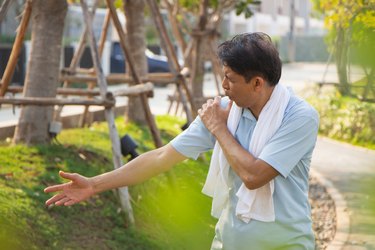
Shingles are most commonly diagnosed in people over age 50, according to the Penn State Milton S. Hershey Medical Center College of Medicine. This painful virus can cause chills, headache, fatigue and tingling sensations on the skin. While exercise can help to relieve stress that may occur due to shingles, make a few considerations before continuing your exercise program while you experience shingles.
Significance
Video of the Day
If you experienced the varicella-zoster virus—more commonly known as chickenpox—as a child, the virus lies dormant in your body. When stress, illness or other unknown triggers stimulate this virus, it can re-occur as shingles, according to the National Institute on Aging. Shingles symptoms can vary from person to person, but often include skin-related pain, such as fluid-filled blisters, itching or tingling and numbness. If you experience shingles, medication to relieve pain and reduce skin blistering, and relaxation techniques, such as exercise, can help to reduce stress and maintain good health.
Video of the Day
Beneficial Exercises
Pain and skin eruptions due to shingles can leave you feeling tired and weak. This may make strenuous exercise difficult. However, stress-relieving exercise can be beneficial when you have shingles. Choose exercises like tai chi, which involves slow, controlled movements, to relieve stress and burn calories, according to "USA Today." Other good exercises include swimming, bicycle riding, yoga or walking, according to "Best Health" magazine.
Considerations
While exercising, it's a good idea to wear loose clothing that does not rub against shingles-related skin irritation, according to "Best Health" magazine. Applying colloidal oatmeal powder to blisters before exercising can help to reduce friction between skin and clothing. You also can take a pain reliever, such as ibuprofen or naproxen, to reduce shingles-related pain before exercising, according to MayoClinic.com.
Expert Insight
Both the prevention and treatment of shingles can be assisted through a healthy lifestyle. Healthy diet, regular exercise and low stress levels can not only prevent shingles, they can reduce symptoms if shingles does occur. This is especially beneficial for those ages 50 and older, according to Andrew Monjan, a National Institute on Aging representative who conducted a study on shingles and exercise.
Warning
While shingles is not contagious to those who have experienced chickenpox, you are contagious to those who have not, according to "Best Health" magazine. When it comes to exercise, this means it may be best to avoid group exercise settings, such as a gym, when you are experiencing shingles. This can reduce the possibility for infection.
Is this an emergency? If you are experiencing serious medical symptoms, please see the National Library of Medicine’s list of signs you need emergency medical attention or call 911.